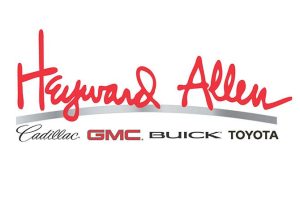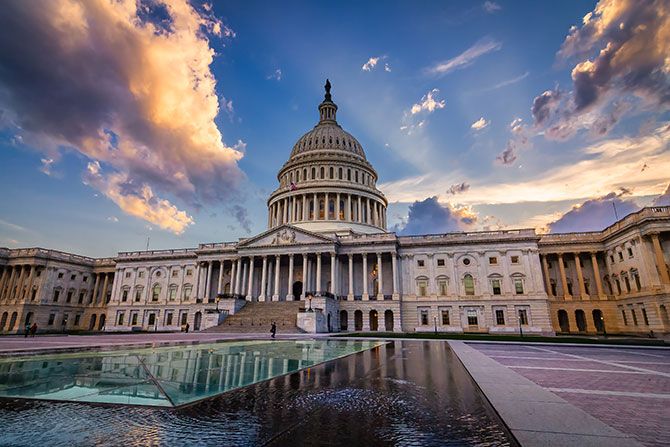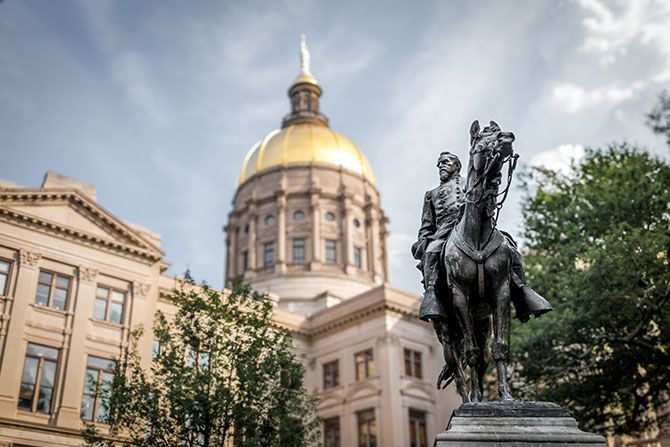Dear GADA members, GADA Board of Directors and staff,
Before sharing the latest NADA news, I want to take a moment to thank you for the tremendous opportunity to serve on the GADA Board of Directors in various roles for the past 20+ years, as well as serving as your director on the NADA Board of Directors for the past several years. It has been an honor and a privilege to represent you, as I conclude serving as your NADA director effective June 30, 2024.
Please know that both GADA and NADA work tirelessly to represent you, navigating many legislative, regulatory and franchise issues, the media, and the public. The following is an update on major NADA initiatives.
EPA Emissions Rule
The Big Picture: The EPA’s final vehicle emissions rule, which solidifies GHG standards for model years 2027 through 2032, remains far too aggressive and far ahead of consumer demand.
What’s Next: America’s franchised new car and truck dealers will continue to:
- Promote electrification with billions of dollars in investments in facilities, training and inventory;
- Urge the administration to track actual EV sales versus projections and make necessary adjustments to its de facto EV mandates to reflect actual consumer demand; and
- Support Congressional Review Act resolutions or appropriations riders that would disapprove or prevent funding for the administration’s final rule. On May 1, CRA resolutions to undo the final rule were introduced by Sen. Pete Rickets (R-Neb.) and Rep. John James (R-Mich.).
Why It Matters: Our experience working with consumers every day makes us highly skeptical that consumers will adopt EVs anywhere near the levels required.
The charging infrastructure is not ready, the current incentives are not sufficient and high EV prices will price out millions of consumers, particularly low-income Americans, from the new-car market.
FTC Vehicle Shopping Rule
The Big Picture: NADA’s aggressive legal and legislative strategy to stop the FTC’s Vehicle Shopping Rule from taking effect is progressing as planned.
The Latest: In March, NADA and the Texas Automobile Dealers Association (TADA) filed the opening brief in support of our Petition for Review of the Vehicle Shopping Rule in the U.S. Court of Appeals for the 5th Circuit. The brief outlines the numerous reasons why the Vehicle Shopping Rule violates federal law and should be set aside.
An additional six outside groups — including ATAE, NIADA, AFSA and the U.S. Chamber of Commerce — each filed amicus (friend of the court) briefs in support of the NADA/TADA petition.
The FTC’s delay of its own rule pending this judicial review remains in place.
What’s Next: The FTC’s reply brief was due to the court on May 14. NADA and TADA’s brief in response to the FTC was due to the court on June 13. After that, the case will be assigned to a three-judge panel. NADA will then request oral arguments, which could take place as early as Summer 2024.
In Congress … NADA continues to rally support for legislation — “FTC REDO Act” — that would nullify the rule and require the FTC to follow basic regulatory safeguards (the essential ones it failed to perform in the first place) before it could redo the rule.
Additionally, NADA is seeking an amendment (called a “rider”) to a fiscal year 2025 appropriations bill in order to deny the FTC funding for fiscal year 2025 to enforce the Vehicle Shopping Rule.
Why It Matters: The Vehicle Shopping Rule is terrible for consumers and contains draconian penalties for dealers. Complying with it will add massive amounts of time, complexity, paperwork and cost to car buying and car shopping for tens of millions of Americans every year.
So-called “Right to Repair” Legislation
The Big Picture: NADA is working diligently to prevent so-called “right to repair” legislation from advancing in Congress and will vigorously defend dealers should such legislation gain momentum.
What’s New and What’s Next: In November 2023, a so-called “right to repair” bill was reported out of the House Subcommittee on Innovation, Data and Commerce despite numerous bipartisan concerns about the legislation.
NADA, alongside ATAEs and directors, has been engaged in educating members of Congress about the true nature of this legislation, which would require OEMs to provide any third party remote, bidirectional access to all vehicle-generated data “without restrictions or limitations” — including data unrelated to the servicing of the vehicle.
Why It Matters: The information independent repair shops need to repair vehicles — including service information, tool information and training data — is readily available to independent repair shops.
But so-called right-to-repair legislation has little to do with repairing vehicles; instead, it compels OEMs to provide any aftermarket parts manufacturer with the information necessary to produce or offer their own compatible aftermarket parts — including safety-critical parts.
Passage of this bill would create significant privacy, cybersecurity, automotive safety and IP concerns.
Hyundai/Amazon
The Big Picture: NADA has been persistently engaged with the Hyundai National Dealer Council, Amazon and Hyundai since the announcement of the Hyundai-Amazon pilot program for vehicle marketing and shopping.
What’s New and What’s Next: NADA’s immediate engagement prompted Hyundai to quickly clarify to its dealers that while the pilot program would allow marketing and listing of Hyundai vehicles on the Amazon platform, vehicle sales would continue to take place at Hyundai dealerships.
At the request of the Hyundai Dealer Council and Hyundai, NADA’s focus has been on assisting the Hyundai Dealer Council in its efforts to address all questions and concerns about this pilot program and larger partnership. NADA is aware that these discussions between the Hyundai Dealer Council working group, Amazon and Hyundai are continuing in good faith.
Why It Matters: The poor wording and rollout of the Hyundai-Amazon announcement in November understandably resulted in a wave of inaccurate reporting as well as deep concern across the auto industry (both dealers as well as other automakers) about the program and its potential ramifications for Hyundai dealers as well as dealers of other brands.
Ford
The Big Picture: NADA continues to communicate dealer concerns with Ford, especially as it relates to Model e and the improvement of their working relationship with their U300 dealers, formerly known as Select Dealers. And NADA will continue to request that Ford consider adjusting the Model e program based on current EV market adoption realities.
What’s New and What’s Next: In January 2024, Elena Ford visited NADA HQ in Tysons, Virginia, for a day‑long discussion on dealer concerns, dealer training and federal policy actions that impact dealer and OEM operations.
The NADA meeting with Ford to discuss the dealer attitude survey results was held in May.
Why It Matters: In late 2022, Ford announced the Model e program aimed at setting new standards for dealers to qualify to sell and service Ford’s EV vehicles. This program not only mandated EV-related infrastructure at dealerships, but also obligated dealers to spend money on new software systems, training expenses and in-store technology. Ford’s own estimates put this cost at well over $1 million for many dealers.
Also included in the Model e program were mandates to change a dealer’s sales process, service process, inventory stocking strategy, job requirements and qualifications.
Since the announcement date, Ford has suffered an endless wave of dealer dissatisfaction based on the cost, complexity and, in some cases, adjudicated illegality of the Model e program.
Honda/Sony — VW/Scout
The Big Picture: NADA has met with and continues to communicate with leaders of both Honda and VW to express dealer concern that each may be attempting to implement a direct‑sales retail model for its new brands.
What’s New and What’s Next: Although neither company has yet to publicly announce its distribution channel for the newly created brands, NADA will continue to proactively discuss this topic with each company and respond accordingly once a public statement is made by either regarding the distribution channel for these brands.
Additionally, NADA had a meeting with VW in early April, and asked for introductions to the U.S. Cupra team to discuss their planned market entry as reported in Automotive News.
Why It Matters: In late 2022, Volkswagen Group announced the rebirth of the Scout brand, designed to be an all-EV SUV/Truck brand. No distribution method was specified at the time, nor has one been announced or specified since.
In January 2023 at the Consumer Electronics Show (CES), Sony announced a new car brand, built in partnership with Honda. There was no discussion of dealers being allowed to sell these vehicles, but the initial conversation left open the possibility that dealers would be allowed to service them.
Any direct-sales model would, to say the very least, undermine any automaker’s relationship with its franchised dealers, all of whom have made significant investments in their current and future brands.
I will close with the same message you’ve heard me say many, many times — please get involved in local and state politics; “know” your local legislative representatives; support GADA with your presence and your checkbook; and be an active member and supporter of NADA. You will be making a wise “investment” in your future.
All my best.
God Bless,
Steve Middlebrooks
Heyward Allen Cadillac GMC Buick Toyota
Athens, Georgia










